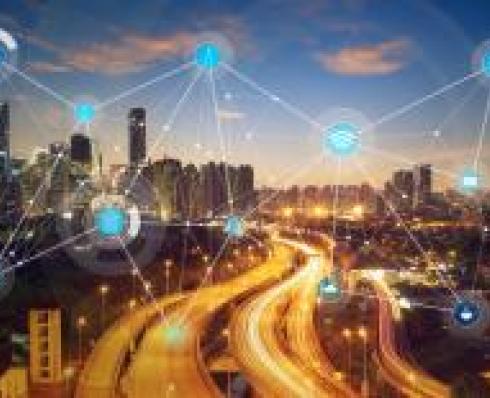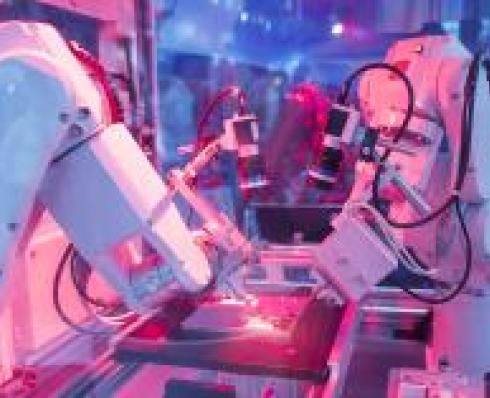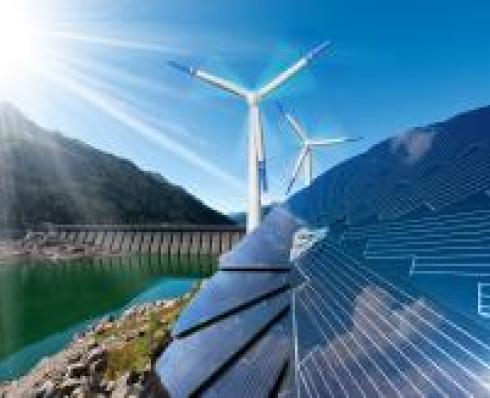
Research & Innovation | School of Electronic Engineering

AI & Machine Learning
Artificial Intelligence (AI) is concerned with getting computers to perform tasks that currently are only feasible for humans. Within AI, Machine Learning aims to build computers that can learn how to make decisions or carry out tasks without being explicitly told how to do so. We conduct innovative research in all areas of Artificial Intelligence & Machine Learning including:
- Deep Neural Nets
- Deep Learning
- Natural Language Processing (see Computational Linguistics Group)
- Semantics, Ontologies and Reasoning
- Multi-Agent Systems
- Recommender Systems
Faculty Members

Comms Networks and Future Comms
Advanced networking technology provides the lines that support today’s online services. The growing demand for video streaming and video conferencing, cloud computing, smart homes and cities, phone payments and decentralised finance, and many other services that require network connectivity spurs our research into future communications networks.
Our team explores such topics as enhancing wireless bitrates using Multi-Input, Multi-Output (MIMO) communications and improved models of radio wave propagation, and delivering wireless services in challenging environments such as inter-vehicle communication (IVC). In fixed or “tethered” networks, we explore optimising the design and interconnection of such network resources as switches and routers in data centres and the wider Internet.
Our research also involves developing and enhancing the network protocols that support all the services and applications delivered over today’s and tomorrow’s wireless and fixed networks.
We conduct innovative research in all areas of Comms Networks and Future Comms including:
- 5G+
- Data Networks
- Wireless Communications
Faculty Members

Computer Vision
Computer vision is a field of artificial intelligence that trains computers to interpret and understand the visual world. Using digital images from cameras and videos and deep learning models, machines can accurately identify and classify objects, and then react to what they “see.”
We conduct innovative research in all areas of Computer Vision including:
- Image Processing & Analysis
- Industrial Vision
- Consumer
- Biomedical
- 3D Visualization
- Augmented Reality for home rehab and sports performance
Faculty Members

Connected Embedded Devices/IoT
The Internet of Things (IoT) is a computing concept describing the interconnectivity and collaboration of a wide variety of everyday physical objects connected via the Internet. Rapid IoT development has been driven by ongoing research and technological advances (notably in 5G mobile communications and in Artificial Intelligence). IoT technologies are enabling a wide range of business opportunities in the context of “smart” homes, neighbourhoods and cities and in the exploitation of intelligent infrastructure and services, in areas such as transport, power and healthcare.
We conduct innovative research in all areas of Connected Embedded Devices/IoT including:
- IoT Devices
- Systems & Analytics
- Built environment sensing
- IoT Networking
- Security & Privacy
Faculty Members

Control, Robotics , Intelligent systems
As robotic systems make their way into standard practice, they have opened the door to a wide spectrum of complex applications. Such applications usually demand that the robots be highly intelligent. Future robots are likely to have greater sensory capabilities, more intelligence, higher levels of manual dexter ity, and adequate mobility, compared to humans. In order to ensure high-quality control and performance in robotics, new intelligent control techniques must be developed, which are capable of coping with task complexity, multi-objective decision making, large volumes of perception data and substantial amounts of heuristic information. Hence, the pursuit of intelligent autonomous robotic systems has been a topic of much fascinating research in recent years.
We conduct innovative research in the following areas:
- Cooperative Robotics
- Lidar
- Bioelectronics
- Vehicular ad hoc networks (VANETs)
Faculty Members

Photonic Communications
Photonics is the physical science of light waves. It encompasses generating, guiding, manipulating, amplifying and detecting light. It is a branch of science that is behind many of the innovations which have transformed the way we live.
Photonic communications specifically refers to the use of photonics for transmitting information as light over optical fibre or through free space. Fibre optic communications currently provides the backbone for internet connectivity. Many challenges are posed by the growing demand for video streaming, cloud computing, smart homes and cities, and other services. Overcoming these requires new photonic technologies to increase capacity, and reduce power consumption and cost of the network.
Our team explores topics such as innovative optical devices, novel optical systems and network architectures and advanced digital signal processing technologies.
We conduct research in all areas of Photonic Communications including:
- Optical Access Networks
- Data Centre Networks
- Long Haul Optical Communication Systems
Faculty Members

Photonic Sensing
Photonics enabled Spectroscopy, Sensing, and Imaging. Photonics is a key enabler for enhancing the safety and security of society, goods, and the environment. It enables a diverse range of sensors and visual applications operating in various ranges of the electromagnetic spectrum from visible to terahertz.
Recent advancements in optical sources and detectors have opened up new opportunities for sensing, spectroscopy, and imaging techniques. Optical devices in conjunction with fibre sensors can be used to detect structural defects in the building sector, prevent environmental pollution and develop driver assistance systems. Other technologies based on photonics sub-systems and detectors aid in the detection of harmful gases or illegal goods.
The team at DCU carry out research that spans from innovative optical devices, novel sub-systems to high-precision sensing systems. This includes work on tuneable lasers, optical frequency combs, dual optical frequency combs, THz sensors, and intelligent and real-time detection schemes.
Faculty Members
Plasma, Semiconductors, Nanomaterials
Since the dawn of humanity we have been making materials to change and improve our lives. While early humans may have an understanding of simple processes to make things from stone axes to metal tools, we now have a much more fundamental understanding of how materials behave at the atomic level. The manipulation of materials on these incredibly small scales - such materials are often referred to as Nanomaterials - is a key research focus in the School of Electronic Engineering.
Our research focus runs from the development and processing of nanomaterials, using advanced characterisation techniques to understand how these materials can be manufactured more controllably and sustainably, through to the deployment of these materials for energy, optoelectronics, advanced wearable and non-wearable sensors, medical and environmental applications. Our main research activities include:
Advanced plasma process control, measurement, and diagnostics for IC manufacturing, including radio frequency spectroscopy, plasma enhanced surface engineering, plasma nanofabrication, plasma medicine, x-ray diffraction imaging, optoelectronic materials and device fabrication, Energy harvesting materials and devices.
Faculty Members
RF devices and propagation, RF and advanced circuit simulation
The RF propagation group develops site-specific propagation models as well as algorithms for electromagnetic wave scattering. Various computational electromagnetics techniques are employed, including the Method of Moments, Parabolic Equation and ray tracing based on Uniform Theory of Diffraction. Researchers are actively involved in COST Action CA20120 - Intelligence-Enabling Radio Communications for Seamless Inclusive Interactions (INTERACT) and PhD course provision as part of the European School of Antennas and Propagation.
Circuit simulation is a crucial part of modern circuit design. It provides insight into system and device behaviour and avoids the costs associated with experimental prototypes. However, with the rapid advances in modern technologies, there are significant challenges if simulation tools are to keep pace with such developments. There is an ongoing need for research into modelling and simulation techniques to enable efficient simulations while maintaining a required level of accuracy. This is the focus of the research group at DCU.
Faculty Members

Sensor Analytics
The recent advancement in IoT and related sensing technologies has resulted in a proliferation of sensors in our surroundings. These sensors are capable of continuously monitoring the contextual information which can be further analysed for various intelligent applications. Sensor analytics refer to the development of innovative technologies and techniques to capture, process, and analyse real-time sensor data. Research challenges in this area include;
- Designing innovative sensing devices e.g. wearable devices, biodegradable sensors
- Building efficient data processing pipelines to acquire, process and analyse sensor dat
- Develop optimal algorithms for sensor data analytics
- Build intelligent real-time applications for decision making over live sensor data streams and developing advanced sensing materials and sensor devices, both wearable and nonwearable, for IoT applications.
We conduct research in areas of Sensor Analytics including:
- Health
- Agri-Tech
- Wearable sensing
Faculty Members

Smart Energy
Smart energy technologies involve the integration of advanced embedded computer and communications functionality - the so-called Internet-of-Things (IoT) - and energy systems, in order to achieve higher performance and especially overall energy efficiency and integration of variable renewable energy sources (wind and solar energy particularly). Applications range from the so-called smart meter and smart home capabilities, which can dynamically adjust energy demand to better match variations in wind and solar availability, as well integration of battery energy storage systems both standalone and, increasingly, on-board electric vehicles.
All of these interventions can help with the urgently needed decarbonisation of our energy systems in order to effectively address the global climate crisis. The Smart Energy team at DCU works on advanced design of the electronic hardware components and the control and communications software required to underpin these important developments.
We conduct research in all areas of Smart Energy including:
- Self-powered sensors
- Energy harvesting textiles
- Smart Transportation or Intelligent Transportation Systems
Faculty Members

Sustainable Energy Policy
Addressing the global climate emergency depends critically on rapid decarbonisation of our energy systems, to eliminate emissions of carbon dioxide as soon as possible, and certainly before 2050. It will likely also be necessary to engineer the active removal of excess carbon dioxide from the atmosphere. This is both a technical and a societal challenge. Rapid development and deployment of sustainable energy sources, with zero ongoing carbon dioxide emissions, will be essential. In the case of Ireland this will most likely depend primarily on rapid scaling up of wind and solar energy sources, very large scale energy storage system (TWh+), and electrification of transport and heating energy use.
However, because of the urgency that now exists, these technical interventions will have to be complemented by major changes in societal activities to significantly reduce overall energy use. Such changes will only be possible if they can attract broad societal support and are seen to be just and equitable both nationally and internationally. The Sustainable Energy Policy team at DCU is focussed on providing systems level analysis to support policy makers, agencies, companies and society as a whole to understand the scale and urgency of these challenges, the engineering technologies, and options that are available to address them, and help navigate the difficult tradeoffs that then arise.

Technology & Education
Technology and Education refers to the research avenue which proposes means of employing the latest innovative technological solutions in education for the benefit of students and trainees, on one hand and educators, teachers and trainers on the other hand.The expectations are that by using novel technology-enhanced solutions, not only there will be an increase in quality of learning and learning outcome, but also there will be an improvement in learning satisfaction. This is expected to result in attracting more representatives of the next generation to a wide range of topics, including Science, Technology, Engineering and Mathematics (STEM) ones, often perceived as difficult, although they are very rewarding.
We conduct innovative research in areas of Technology & Education including:
- Learning Analytics
- Gamification in teaching
Faculty Members

Multimodal Data Analytics
In the modern digital world, data comes from a wide range of sources resulting in rich and complex data modalities that need to be analysed. Examples of common modalities are visual data from images, language data from text and speech, audio data from music and other sounds and even sensory data such as smell, taste or touch. In fact, often the data streams combine multiple modalities, such as video which typically includes at least image and sound (speech, music) and text (multi-lingual subtitles). Human sensing in particular often requires the combination of visual (facial analysis), audio (speech), haptic (touch) and movement or physiological data from wearable sources. This research theme addresses the integration and interpretation of data within and across modalities as well as human interaction with multimodal data and the knowledge and insights that can be derived as a result.
Faculty Members:
